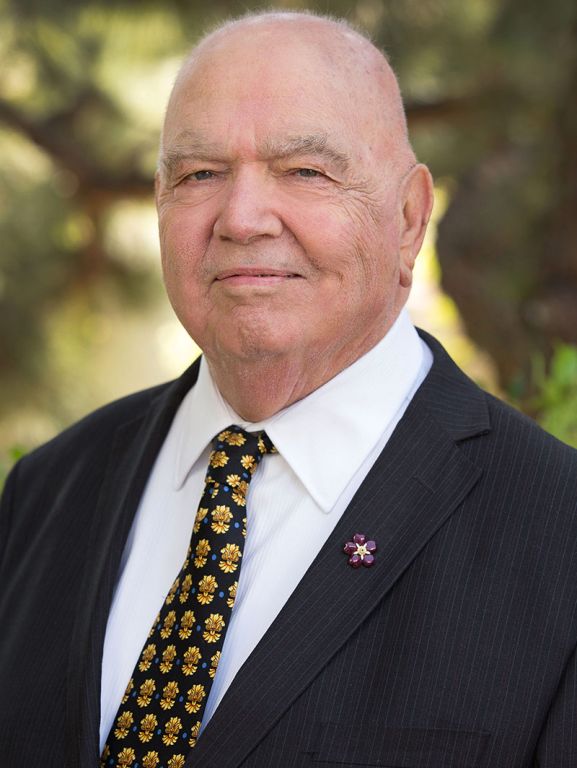We Remember Dr. Richard Hovannisian, 90, an Esteemed Historian and Chronicler of the Armenian Genocide

The USC Shoah Foundation mourns the passing of our friend Dr. Richard Gable Hovannisian, a scholar who devoted his life to chronicling the 1915 Armenian Genocide and donated the more than 1,000 survivor and witness testimonies he amassed to the USC Shoah Foundation. He was 90.
Born to Armenian Genocide survivors in Tulare, California, in 1932, Dr. Hovannisian was initially discouraged from learning his parents’ language and knew little about Armenian history.
After receiving a B.A. in History from UC Berkeley and an M.A. and Ph.D. from UCLA, Dr. Hovannisian joined the UCLA faculty in 1962 and later—inspired by his travels to the Middle East—founded the university’s first Armenian history programs.
In 1969 he created the UCLA Armenian Genocide Oral History Project, an initiative for his students to record and transcribe audio interviews with Armenian Genocide survivors, primarily in the Los Angeles area. Over the next 50 years, Dr. Hovannisian and his students amassed more than 1,000 testimonies in what is believed to be the largest collection of its kind in the world.
In a 2011 interview with the UCLA Daily Bruin, Dr. Hovannisian described his motivation in capturing the experiences of as many Armenian Genocide survivors as possible.
“I grew up with that generation of survivors, and I thought they’d be around forever,” he said. “Then I looked left, and I looked right, and they were disappearing.”
In 2018, Dr. Hovannisian entrusted the Armenian Genocide Oral History Collection to the USC Shoah Foundation in order that the interviews be preserved and made publicly available in perpetuity. The collection consists primarily of full-life histories which illuminate Ottoman-Armenian life, the Genocide and post-Genocide era, and the diaspora experience. Survivors are from all over the Ottoman Empire, and many interviewees are from the former Russian and Persian empires. Testimonies are mostly in Armenian and English, with some in Turkish and Spanish.
To date, more than 600 testimonies have been integrated into the Visual History Archive (VHA), where they are searchable with keywords at access sites around the world. Indexers are currently working to integrate the remaining testimonies into the archive.
Speaking at a USC event in 2019, the esteemed academic described the cumulative force of the 1,040 testimonies he and his students recorded.
"The quality of these interviews is mixed. One interview may not be that great, but when you put them together, it's in the collectivity of the testimony that you have the strength of it. It's with the collectivity of it that you feel the real horror, the terror, of what genocide is, and how extensive it can be from one end of a country to another. And how cruel it can be. Cruelty after cruelty after cruelty."
The Armenian Genocide Oral History Collection joined the 330 testimonies that had been donated to the USC Shoah Foundation by filmmaker J. Michael Hagopian and the Armenian Film Foundation in 2010. Together they constitute the largest non-Holocaust-related collection in the USC Shoah Foundation's 56,000-strong VHA.
USC Shoah Foundation Finci-Viterbi Executive Director Chair Dr. Robert J. Williams spoke of the importance of Dr. Hovannisian’s donation and his contribution towards the understanding of the Armenian Genocide.
"Dr. Hovannisian’s illustrious career as a historian bequeathed an important and unparalleled legacy,” Dr. Williams said. “Thanks to his foresight, and the significant partnership he developed with the USC Shoah Foundation, the Visual History Archive now contains more than 600 Armenian testimonies that scholars, researchers, and others around the world can use in their work for many years to come."
The USC Institute of Armenian Studies issued a statement Tuesday praising a man they described as “a titan in the field of Armenian Studies.”
“[Dr. Hovannisian] lived the life of a public intellectual,” the statement said. “He became a historian with a mission—to promote the study of the Armenian Genocide as a consequential 20th-century event. His research and publications cemented the place of the first Republic of Armenia in Armenian history and world history...His name has been omnipresent in academia for nearly seven decades, making space for Armenian scholars at institutions once out of reach.”
Over the course of his distinguished career, Dr. Hovannisan authored a number of books including Armenia on the Road to Independence (1967), The Republic of Armenia, Volumes I-IV (1971-1996), and The Armenian Holocaust (1980).
He was a Guggenheim Fellow and served on the board of directors of organizations including Facing History and Ourselves, the International Institute on the Holocaust and Genocide, and the Society for Armenian Studies, which he co-founded.
In 1998 Dr. Hovannisian was honored by the president of the Republic of Armenia with the Movses Khorenatsi medal and in 2002 received the Republic's Medal of St. Mesrop Mashtots. He was also highly active in political commentary and a voice for the Armenian diaspora in Los Angeles and across the United States.
Dr. Hovannisian is survived by his children, Raffi, Armen, Ani, and Garo, all of whom are active in the Armenian community. Raffi is a politician in Armenia and the country’s first foreign minister and Ani produced The Hidden Map, a documentary about her journey to her ancestral homeland, which aired on PBS in 2021.
In this clip from a 2015 interview, Dr. Hovannisian discusses the emotions expressed by Armenian genocide witnesses in their testimonies
https://www.youtube.com/watch?v=LZoUBlV5DSU
The VHA contains two testimonies from Dr. Hovannisian, one recorded by the Armenian Film Foundation in 1975 and one by the USC Shoah Foundation in 2017.
Like this article? Get our e-newsletter.
Be the first to learn about new articles and personal stories like the one you've just read.